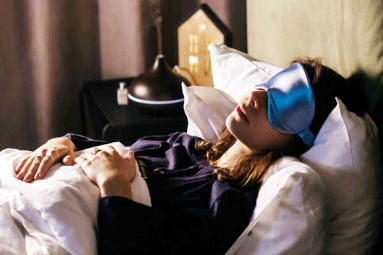
(Image source from: How your job is slowly driving you sleepless?})
With 65% of our waking hours spent at work, it's time we started considering the enormous impact it has on our lives, more so our sleep? Baffled! Read on.
Have you ever paused to ask yourself the kind of hazards your work pose to your health and sleep? Rotating schedules, overnight or early morning hours, extensive travel, high-stress and high-pressure responsibilities can undermine healthy sleep routines, and bring about chronic health problems, especially as we age. Depending on its schedules and demands, different jobs will pose different challenges to regular, restful, sufficient sleep. Here are a few of the most common work-related sleep problems:
Shift work. Shift work can pose serious problems for sleep. Working changing or rotating schedules makes it difficult to establish a consistent sleep routine. Getting up and going to bed at different times of the day isn't just inconvenient -- this lack of routine can cause disruptions to the body's circadian rhythms, the 24-hour biological "clock" that regulates sleep-wake cycles. Shift workers are at higher risk for sleep disorders including insomnia and obstructive sleep apnea. Research shows that shift workers are at greater risk for accidents and injury, as well as for chronic diseases associated with poor sleep, including heart disease and stroke. Who works shifts? In today's world, more and more people work something other than the traditional routine Monday-to-Friday daytime schedule. Doctors, nurses and other medical professionals, as well as airline and airport personnel and manufacturing workers are some of the professions that traditionally involve shift work. But in our globally-connected 24/7 society, people in fields like technical support and customer service are often working irregular and evening shifts. People who have to travel frequently for work and contend with jet lag can also experience similar sleep problems to shift workers. Many of our public health and safety professionals work shifts, including police and firefighters. This makes sleep problems associated with shift work a public health issue of its own, as we all have a vested interest in addressing sleep issues in these fields.
Long hours. Sometimes it's not a changing schedule that interferes with sleep, but the duration of work that poses hazards to sleep and health. Studies show that working long hours is associated with several sleep problems, including shortened sleep times, difficulty falling asleep and daytime impairment. A recent study of nurses found that those working overtime and long hours were more likely to report poor sleep than those with less grueling schedules. These same nurses were also more likely to be overweight or obese and to exercise less and were more likely to engage in unhealthy behaviors, such as smoking. A great many jobs fall into the "long hours" category, including many supervisory and management positions. The connection between long hours and sleep problems may not be as recognized as that of shift work, but the impact is very real and deserves more study and attention.

High stress. Stress and worry are enemies to sleep. And a high-stress, high-pressure job can make it difficult to leave work concerns at the office. Research shows that worry has its greatest effect on sleep during the ages 35 to 55 -- right smack in the middle of most career trajectories. (Of course, it's also the time when people are also often raising families.) Jobs that from the outside may seem downright cushy -- high-paying, high-prestige positions in industries such as business and finance, science and engineering and information technology -- often come with non-stop pressure and responsibility that can undermine health and sleep. Positions such as these demand long hours. Many of these demanding high-pressure jobs are ones that people never really leave, where the separation between work life and non-work life is tenuous at best. Research is beginning to explore the toll that high-intensity work has on health and sleep. Recent studies have shown significantly elevated rates of insomnia among software engineers (compared to the general population), and among Wall Street investment bankers, who are contending with insomnia and depression.
Often we're so busy managing our daily lives that we stop paying attention to what's right in front of us. If you're having trouble building and maintaining a healthy sleep routine, taking a closer look at how your job affects your sleep may help lead you to more effective strategies for getting the rest you need.
Source: Huffington Post
AW: Suchorita Dutta




















